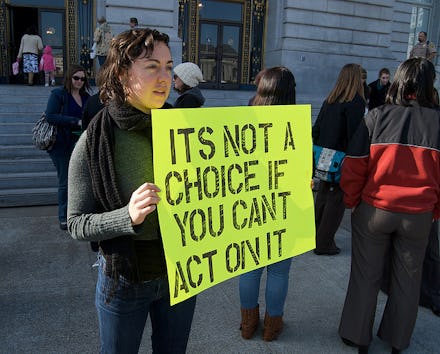What It Was Like To Live in a Country Where Abortion is Illegal

I was a few weeks into my summer-long stay in Lima when I was drugged and raped. I don't remember much — just flashes of the attack, coming to while running away, and knowing, both physically and mentally, that I had been assaulted. Feeling ashamed, scared, and unsure how to ask for help (abortion is illegal in Peru unless the pregnancy is life-threatening), I waited until I got back to the U.S. to go to a clinic. Fortunately, all results came back negative.
Though abortion isn't illegal in the U.S., Targeted Regulation of Abortion Providers (TRAP) laws across the nation — like the ones Gov. John Kasich (R-Ohio) recently implemented and the Texas one that the Supreme Court just protected — threaten women's ability to access abortion care even in instances of assault like mine.
TRAP laws, often introduced under the guise of protecting women, hold clinics to outlandish regulatory standards, forcing them to increase their costs, or even close their doors. As a result of these closures, some women now have to drive hundreds of miles just to get to the closest clinic.
This isn't just inconvenient, it's devastating. As Kellie Copeland of National Abortion and Reproductive Rights Action League (NARAL) Pro-Choice Ohio explains, "It doesn't matter if abortion remains legal if it's so inaccessible you can't get one when you need one."
While I ended up finding ways to make my time in Peru positive, and I truly love parts of the culture, I hated how alienated I felt by their staunch stances on reproductive health, which prevented me from accessing the services I needed. (I also rarely had internet access, was being hosted by a devoutly religious family, and didn't even know of a doctor to go to if I had a fever.) If I had been pregnant, I would have either had to carry my rapist's baby or spend thousands to get back to the States in time to terminate the pregnancy.
But would the U.S. really have been a better place to deal with an unwanted pregnancy? The TRAP laws which have caused over 50 clinics in the U.S. to shut down in the past year are a sneakier way of alienating and shaming women who want autonomy over their bodies, but that is what they do nonetheless.
These laws disproportionately affect women who are already in difficult positions — minorities, non-citizens, the poor, victims of sexual assault, and the immobile, to name a few. A striking example of this are women who must cross state lines to get to a clinic, but cannot do so for fear that their non-citizen status will be discovered. For such women, seeking reproductive healthcare can mean risking deportation. In another instance, Texas' recent 22-week ban forced one 24-year-old, who found out her baby inherited her life-threatening genetic disease, to travel to New Mexico by overnight bus because her decision came too late for Texas to accept her.
I'll always feel lucky to live in a country that affords me freedoms I would not have if I lived elsewhere. But, the more I think about TRAP laws, the more I wonder if the major thing separating us from countries that outlaw abortion outright is the fact that we aren't honest about it.